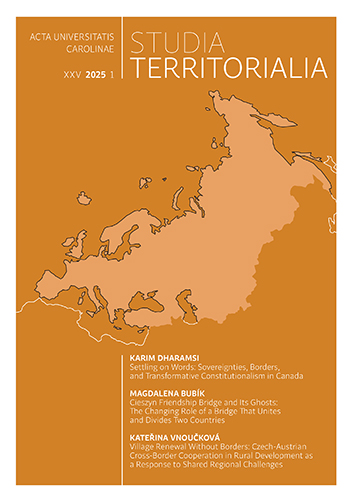AUC Studia Territorialia je recenzovaný akademický časopis z oboru teritoriálních studií. Zaměřuje se na otázky politického, hospodářského, společenského a kulturního vývoje zemí Severní Ameriky, Evropy a postsovětské Eurasie ve 20. a 21. století. Vznikl v roce 2001; v současnosti vychází dvakrát ročně, a to v elektronické a tištěné podobě. Publikuje původní odborné studie, recenze, zprávy o knižních novinkách, konferencích a probíhajícím výzkumu, jakož i jiné kratší odborné texty. Časopis vydává Institut mezinárodních studií FSV UK.
AUC STUDIA TERRITORIALIA, Vol 18 No 2 (2018), 31–62
On the Necessity for and the Limits of Political Apologies in Post-1989 Eastern Germany
Maria Palme
DOI: https://doi.org/10.14712/23363231.2019.11
zveřejněno: 03. 06. 2019
Abstract
Since the 1990s, the making of an apology has become an instrument for promoting international and national reconciliation, replacing the exaction of vengeance upon the officials of former non-democratic regimes. This article explains when and under what circumstances an explicit apology for political wrongs has contributed to overcoming divisions in post-socialist German society. It specifically focuses on politicians and political parties that have direct links and continuity with the former oppressive regime in East Germany. What role and what impact have political apologies had on the victims to whom they are addressed and on public discourse generally? Are they part of a broader acknowledgment of past injustices under the German Democratic Republic (GDR) dictatorship? Adopting a discourse analysis approach, this paper outlines the historical and political conditions, the intentions and the outcomes of speeches of political apology in eastern Germany. It focuses on the narratives of GDR officials, Stasi informants, and members of Die Linke (The Left), a successor party to the GDR’s ruling communist Socialist Unity Party (SED), and on the responses to those narratives from the new elites, former dissidents in the GDR, and groups representing the victims of communism. The article concludes that political apologies expressed by state officials who were formerly linked with the oppressor state stimulate a dialectical process with regard to past injustices, even if they fail to achieve the desired reconciliation.
klíčová slova: political apology; reconciliation; collective memory; Germany; communism
Published by the Karolinum Press. For permission to use please write to journals@karolinum.cz.
148 x 210 mm
vychází: 2 x ročně
cena tištěného čísla: 180 Kč
ISSN: 1213-4449
E-ISSN: 2336-3231
